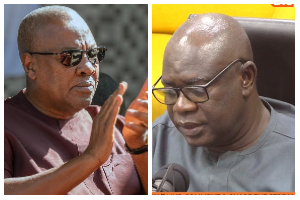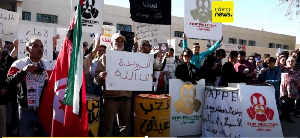Irmo, South Carolina
6TH February, 2015
In the midst of the acrimonious debate about the death of J.B. Danquah, some have questioned the relevance to Dumsor and other problems of what happened in the condemned cells at Nsawam a half-century ago.
George Santayana said “Those who ignore history are condemned to repeat its tragedies”. He was right.
In the heady days following the fall of the Berlin Wall, Francis Fukuyama wrote a book called, “THE END OF HISTORY AND THE LAST MAN”. Boy was he wrong. Since then, there has been Al Qaeda, 911, fourteen of the last fifteen warmest years in history and the election of a black, Barrack Obama as President of the United States.
As to the supposed irrelevance of history, tell a black American that slavery does not matter and hear what he says.
Tell that to the Israelis and the Palestinians and hear what they say. Israel exists today because for thousands of years, after they were exiled, they taught their children their history and greeted one another with, “Next year in Jerusalem”. Over half a century after the end of the holocaust, Nazi operatives are still being hunted down.
The Balkan crisis was rooted in history. The war in Ukraine is rooted in history.
History is littered with the pain of those who have ignored history and suffered tragedies. In 1973, Chile had been an uninterrupted democracy for a century. They bragged that there will never be another coup in Chile. Then Pinochet struck.
Just before Ghana’s elections in 2008, former President Rawlings let it slip that the NPP government should expand Nsawam prison because if the NDC won, many NPP members would find new homes in the prison. After the elections, he was determined to live up to that threat but one man stood in his way—former President Atta-Mills. That dispute over the wholesale detention of NPP members was the issue that broke the relationship of the two men beyond repair. Ghanaians have the late President to thank for not seeing preventive detention again.
That is why the nation that has plenty of time to discuss Asiedu Nketia’s wardrobe must find time to discuss its history. Furthermore, if we ignore history, one of these days, we will all be speaking Chinese or American slang and singing foreign anthems.
Since Nana Addo’s presumptuous forgiveness of Nkrumah’s role in Danquah’s death, many have weighed into the debate. Except for the absence of candour and of grace, that is healthy.
First, Prof. Agyemang Badu Akosah, a great physician still reciting stuff from his young pioneer days said Danquah was no Saint. Of course, he wasn’t. Then he went on to assert on Radio Gold that “when J.B. Danquah was arrested within the precincts of the GBC, he was with a prepared speech to broadcast to the nation and the timing was well choreographed to coincide with the attempted assassination of Nkrumah by policeman Constable Ametewe.”
Really, Prof? Actually, earlier that day, Danquah was also in the court buildings. Was he there to be sworn in as the next President? How could the assassination of the CPP’s Nkrumah make the UP’s Danquah president in a constitutional dispensation? Does Prof. Akosah have a copy of the speech in question? Let’s see it, please. If the evidence against Danquah was so clear and overwhelming, why did the CPP not try him instead of subjecting him to detention without trial?
Then, as she was destined to do, Ms. Samia Nkrumah weighed in. According to reports, “Ms. Nkrumah insisted that Kwame Nkrumah and his family do not need to be forgiven since “we have forgiven but this whole issue is not important to us”. She went on that Nkrumah and the CPP “have forgiven the coup plotters—those who tried to assassinate Kwame Nkrumah over 9 times or so. We have forgiven them a long time ago but that is not the issue.”
So now, here are the scions of two great families purporting to forgive each other’s ancestors for great crimes against their families while the majority of Ghanaians stand by. For a moment, you would think these are the royal families of two great kingdoms settling a dispute.
First, since Nkrumah was not a private citizen in the actions that led to Danquah’s imprisonment, there ought to be an apology from the state, in whose name Danquah was detained wrongly, before forgiveness, not just of Nkrumah but the nation Ghana. Even God properly prefers repentance to precede forgiveness. As for Ms Samia’s claim that Nkrumah did nothing wrong, I beg to differ. J.B. Danquah should never have died in a condemned cell to which he had been sent without trial. That will always be a stain on Nkrumah’s legacy and Ghana’s conscience.
Second, without knowing with certainty who was behind them, the attacks on Nkrumah’s life were wrong. It is wrong for people to seek to change leaders through violence in a democracy.
Third, Preventive Detention was wrong. It is wrong, except in times of war, for people to be picked up in the middle of the night and taken to prison.
I know there are disputes about whether bomb attacks led to preventive detentions or preventive detentions led to the throwing of bombs.
There should be a collective quest to understand these difficult issues so that the lessons will guide us in the future. Furthermore, we must judge people in context. It should be possible to admire Nkrumah’s vision and vigour while acknowledging that he made some egregious errors. It should be possible to acknowledge that Nkrumah was perhaps, our most significant founder while acknowledging that there were other legitimate founders of Ghana, outside even the big six and going as far back as the Fante Confederacy. We need fair and balanced history, written with fidelity to the truth and sensitivity to those who have been harmed unfairly.
Finally, as to the political parties, a party that will not fight for its founding ideals and defend the integrity of those who founded it cannot be counted on to stand for the masses that are needed to win elections.
Let us move forward together.
Arthur Kobina Kennedy
Opinions of Saturday, 7 February 2015
Columnist: Kennedy, Arthur Kobina














